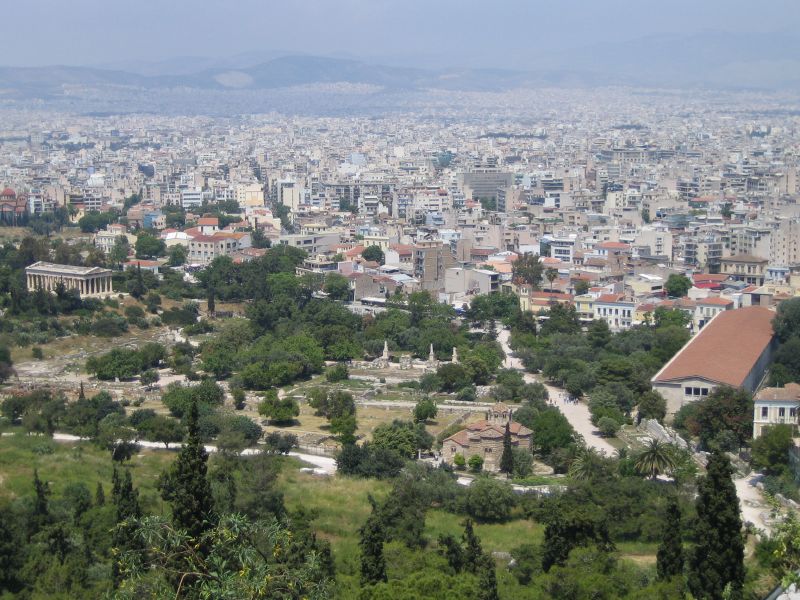|
Agoraios Kolonos
Agoraios Kolonos (; grc, Κολωνός Ἀγοραῖος; ell, Αγοραίος Κολωνός, meaning "the hill next to the Agora"), located to the south and adjacently situated on a hill near the Temple of Hephaestus, used to be the meeting place of the ancient Athenian craftsmen. URL accessed on June 2, 2008. See also *Ancient Agora of Athens
The ancient Agora of Athens (also called the Classical Agora) is the best-known example of an ancient Greek agora, located to the northwest of the Acropolis and bounded on the south by the hill of the Areopagus and on the west by the hill kn ...
References [...More Info...] [...Related Items...] OR: [Wikipedia] [Google] [Baidu] |
Temple Of Hephaistos 3-2004 2
A temple (from the Latin ) is a building reserved for spiritual rituals and activities such as prayer and sacrifice. Religions which erect temples include Christianity (whose temples are typically called churches), Hinduism (whose temples are called Mandir), Buddhism, Sikhism (whose temples are called gurudwara), Jainism (whose temples are sometimes called derasar), Islam (whose temples are called mosques), Judaism (whose temples are called synagogues), Zoroastrianism (whose temples are sometimes called Agiary), the Baha'i Faith (which are often simply referred to as Baha'i House of Worship), Taoism (which are sometimes called Daoguan), Shinto (which are sometimes called Jinja), Confucianism (which are sometimes called the Temple of Confucius), and ancient religions such as the Ancient Egyptian religion and the Ancient Greek religion. The form and function of temples are thus very variable, though they are often considered by believers to be, in some sense, the "house" of ... [...More Info...] [...Related Items...] OR: [Wikipedia] [Google] [Baidu] |
Agora
The agora (; grc, ἀγορά, romanized: ', meaning "market" in Modern Greek) was a central public space in ancient Greek city-states. It is the best representation of a city-state's response to accommodate the social and political order of the polis. The literal meaning of the word "agora" is "gathering place" or "assembly". The agora was the center of the athletic, artistic, business, social, spiritual and political life in the city. The Ancient Agora of Athens is the best-known example. Origins Early in Greek history (13th–4th centuries BC), free-born citizens would gather in the agora for military duty or to hear statements of the ruling king or council. Later, the agora also served as a marketplace, where merchants kept stalls or shops to sell their goods amid colonnades. This attracted artisans who built workshops nearby. From these twin functions of the agora as a political and a commercial spot came the two Greek verbs , ''agorázō'', "I shop", and , ''agoreúō'', ... [...More Info...] [...Related Items...] OR: [Wikipedia] [Google] [Baidu] |
Temple Of Hephaestus
The Temple of Hephaestus or ''Hephaisteion'' (also "Hephesteum" or "Hephaesteum"; grc, Ἡφαιστεῖον, ell, Ναός Ηφαίστου, and formerly called in error the Theseion or "Theseum"; grc, Θησεῖον, ell, Θησείο), is a well-preserved Greek temple dedicated to Hephaestus; it remains standing largely intact today. It is a Doric peripteral temple, and is located at the north-west side of the Agora of Athens, on top of the Agoraios Kolonos hill. From the 7th century until 1834, it served as the Greek Orthodox church of Saint George Akamates. The building's condition has been maintained due to its history of varied use. Name Hephaestus was the patron god of metal working, craftsmanship, and fire. There were numerous potters' workshops and metal-working shops in the vicinity of the temple, as befits the temple's honoree. Archaeological evidence suggests that there was no earlier building on the site except for a small sanctuary that was burned during t ... [...More Info...] [...Related Items...] OR: [Wikipedia] [Google] [Baidu] |
Athenian
Athens ( ; el, Αθήνα, Athína ; grc, Ἀθῆναι, Athênai (pl.) ) is both the capital and largest city of Greece. With a population close to four million, it is also the seventh largest city in the European Union. Athens dominates and is the capital of the Attica region and is one of the world's oldest cities, with its recorded history spanning over 3,400 years and its earliest human presence beginning somewhere between the 11th and 7th millennia BC. Classical Athens was a powerful city-state. It was a centre for the arts, learning and philosophy, and the home of Plato's Academy and Aristotle's Lyceum. It is widely referred to as the cradle of Western civilization and the birthplace of democracy, largely because of its cultural and political influence on the European continent—particularly Ancient Rome. In modern times, Athens is a large cosmopolitan metropolis and central to economic, financial, industrial, maritime, political and cultural life in Greec ... [...More Info...] [...Related Items...] OR: [Wikipedia] [Google] [Baidu] |
Ancient Agora Of Athens
The ancient Agora of Athens (also called the Classical Agora) is the best-known example of an ancient Greek agora, located to the northwest of the Acropolis and bounded on the south by the hill of the Areopagus and on the west by the hill known as the Agoraios Kolonos, also called Market Hill. The Agora's initial use was for a commercial, assembly, or residential gathering place. Buildings and structures of the classical agora North side of the agora * Stoa Poikile (Painted stoa), a building built in the 4th century B.C. used purely for socialising unlike many other buildings in the agora. * Altar of the Twelve Gods * Stoa Basileios (Royal stoa) * Temple of Aphrodite Urania *The south end of what is believed to be a Basilica has been uncovered near Hadrian Street and is dated to the mid 100s CE East side of the agora * The Stoa of Attalos, a stoa lined with shops built in the 2nd century B.C. which has since been reconstructed for use as the Museum of The Ancient Agora. * ... [...More Info...] [...Related Items...] OR: [Wikipedia] [Google] [Baidu] |


%2C_Athens_-_20070711.jpg)

